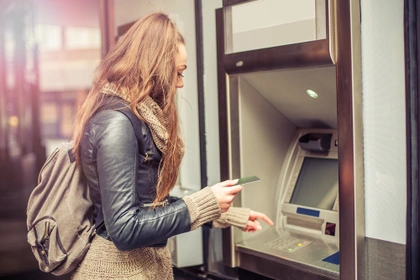What should I do if I’ve lost my credit card?
If your credit card has gone missing, don’t panic – but act quickly to protect your money. The first thing to do is freeze the card if your bank allows it. This temporarily pauses your card while you search and stops anyone using it in the meantime.
You can usually do this easily in your banking app or online banking.
Then take a few moments to check whether your card is genuinely lost or just misplaced.
How to find a lost credit card
It’s easy to panic when you can’t find your card – but it might just be hiding somewhere nearby.
Try the following before cancelling it:
- Retrace your steps – check coat pockets, bags, wallets, surfaces at home or in the car
- Call recent places – like shops, pubs or restaurants, in case it was handed in
- Check your banking app – recent transactions might jog your memory
- Freeze your card – if you haven’t already, do this while you search
If you still can’t find it after a thorough check, it’s best to report it lost.
How to report a lost credit card
Most providers offer several ways to report a lost credit card. Do it as soon as you realise it’s missing to protect your money.
You can usually:
- Use your banking app – often the quickest and easiest method
- Call your bank’s helpline – you’ll find the number online or on a past statement
- Log in to online banking – some providers let you cancel and order a new card this way
- Visit a branch – if you prefer speaking to someone in person
Once reported, your provider will cancel the card and send you a new one, usually within a few working days.
Reporting a lost Ocean Credit Card
If you’ve lost your Ocean Credit Card, you should contact Capital One, who issue the card, straight away. You can either:
- Use the Capital One app
- Call 0800 952 5267
They’ll block your card and arrange a replacement to be sent to you in the post.
What happens if I lost my credit card and someone used it?
If your lost card is used before you report it, you should still be protected. Card providers normally refund any fraudulent transactions — unless they believe there’s been gross negligence (e.g. you shared your PIN or left your card unattended).
To stay on the safe side, never:
- Share your PIN or personal details (not even with your bank)
- Let someone else use your card
- Write down or store your card details insecurely
As long as you act quickly and reasonably, you’re unlikely to be liable.
How to update recurring payments after a lost card
If you have any subscriptions or recurring payments which are taken from your credit card (like Netflix or a gym membership), you’ll need to update your payment details once your new card arrives.
Make a list of services linked to your lost card and log in to update the card number. Otherwise, payments could bounce, and you risk late fees or a service being paused.
Tips to avoid losing your credit card in future
Lost your card before? These tips can help stop it happening again:
💳 Only carry the cards you plan to use
💳 Keep your wallet or purse zipped and secure
💳 Don’t store your card loosely in your pocket or phone case
💳 Regularly check that your cards are where they should be
💳 Store unused cards safely at home
💳 Use mobile payments (e.g. Apple Pay, Google Pay) instead when possible
Act fast to stay protected
Losing your credit card can be stressful – but staying calm and acting quickly can stop fraud and get you back on track.
Even just freezing your card while you search can give you peace of mind, and a few easy habits can help you avoid losing it again.
Ocean Credit Card
See if it's a YES before you apply
- Up to £8,000 credit limit
- Checking won't affect your credit score
- Get a response in 60 seconds
Intelligent Lending Ltd (credit broker). Capital One is the exclusive lender.

Disclaimer: We make every effort to ensure content is correct when published. Information on this website doesn't constitute financial advice, and we aren't responsible for the content of any external sites.






